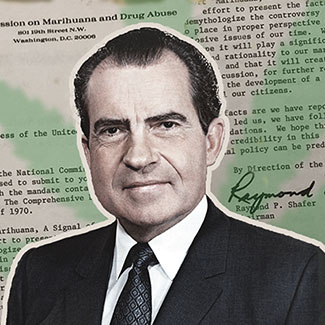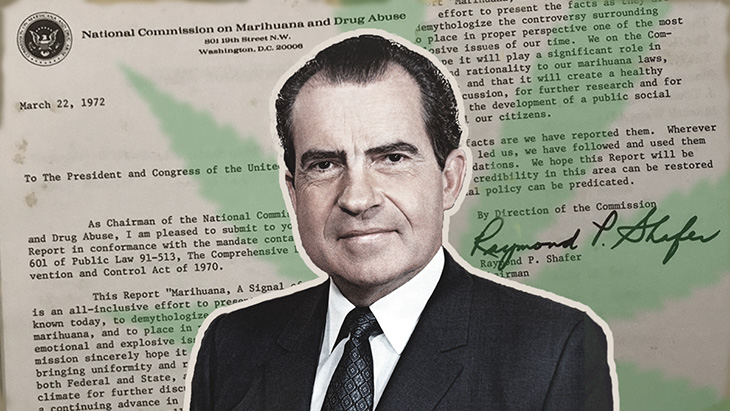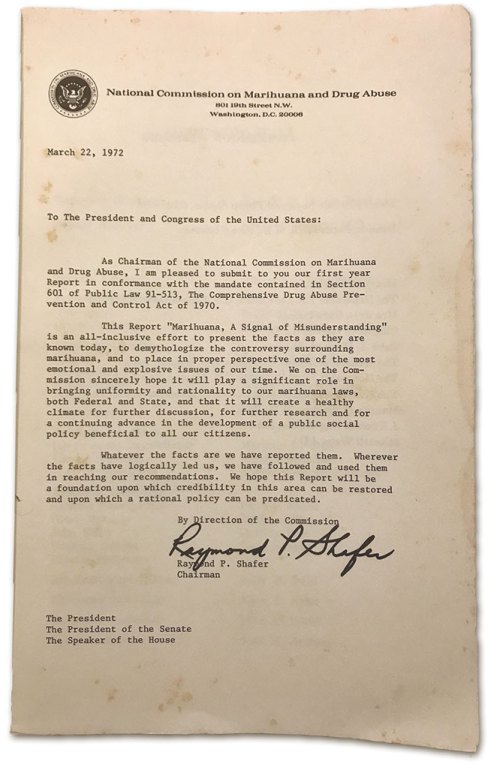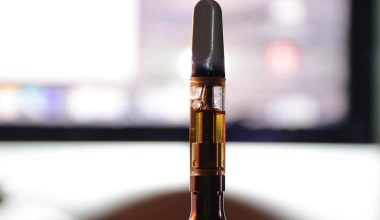
Fifty years ago, the first and only blue-ribbon committee on marijuana policy formally recommended that Congress repeal federal penalties criminalizing the personal possession of marijuana.
On March 22, 1972, the National Commission on Marihuana and Drug Abuse issued its report, Marijuana: A Signal of Misunderstanding, to Congress and to the Nixon Administration. Nine of the members of the Commission had been hand-picked by President Richard Nixon, including the Commission’s Chair, Raymond P. Shafer – then Governor of Pennsylvania. Members investigated the issue for two years prior to reaching their conclusions.
The Committee rebuked claims that cannabis was a highly dangerous substance worthy of criminal prohibition. Rather, it determined: “[T]he criminal law is too harsh a tool to apply to personal possession even in the effort to discourage use. It implies an overwhelming indictment of the behavior which we believe is not appropriate. The actual and potential harm of use of the drug is not great enough to justify intrusion by the criminal law into private behavior, a step which our society takes only with the greatest reluctance.”
The Commission therefore recommended that the “possession of marijuana for personal use no longer be an offense, [and that the] casual distribution of small amounts of marihuana for no remuneration, or insignificant remuneration, no longer be an offense.”
This policy recommendation, now commonly referred to as ‘decriminalization,’ acknowledged that the use of cannabis was not altogether harmless, but recognized that its potential risks to both the individual and to society were not so great as to warrant the criminal prosecution and incarceration of those who consumed it. Though this recommendation was ultimately rejected by Congress, several state governments began adopting this policy in the 1970s.
Today, 32 states and the District of Columbia have enacted legislation either legalizing or decriminalizing the possession of marijuana for adults.
“The Commission’s recommendation to end marijuana possession arrests was totally unexpected at the time, with most observers anticipating the Commission to reinforce Nixon’s exaggerated fears of marijuana and to continue to support criminal prohibition. The report was truly groundbreaking then and it has stood the test of time and remains pertinent now,” said NORML’s founder, R. Keith Stroup – who testified on behalf of NORML in several meetings held by the National Commission prior to the publication of its report. Stroup noted that since the Commission initially made its recommendations, an estimated 30 million Americans have been arrested for violating state and federal marijuana laws. Over 80 percent of those arrested over these past five decades were prosecuted for offenses related to the personal possession and use of cannabis — the very activities that the Commission demanded be decriminalized.
Morgan Fox, NORML’s Political Director, added: “The fact that this report was ignored by the federal government for half a century while countless individual’s lives — and entire communities — were upended and marginalized by misguided cannabis prohibition policies is a stain on our country, but it doesn’t have to continue.
“Congress has the opportunity now to maintain momentum for comprehensive reform that is centered on repairing these harms, and the American people deserve to know where their lawmakers stand on this issue. House leadership should move to hold a floor vote imminently on the Marijuana Opportunity, Reinvestment, and Expungement (MORE) Act. The Biden Administration should also immediately begin following through on the President’s campaign promises to offer pardons and expungement for people convicted of nonviolent federal marijuana offenses.”
Join NORML’s Founder Keith Stroup on NORML’s Facebook page or on our other social media channels for a live discussion of the Shafer Commission and its report at 2pm ET today.
Related
Medical Disclaimer:
The information provided in these blog posts is intended for general informational and educational purposes only. It is not a substitute for professional medical advice, diagnosis, or treatment. Always seek the advice of your physician or other qualified healthcare provider with any questions you may have regarding a medical condition. The use of any information provided in these blog posts is solely at your own risk. The authors and the website do not recommend or endorse any specific products, treatments, or procedures mentioned. Reliance on any information in these blog posts is solely at your own discretion.







